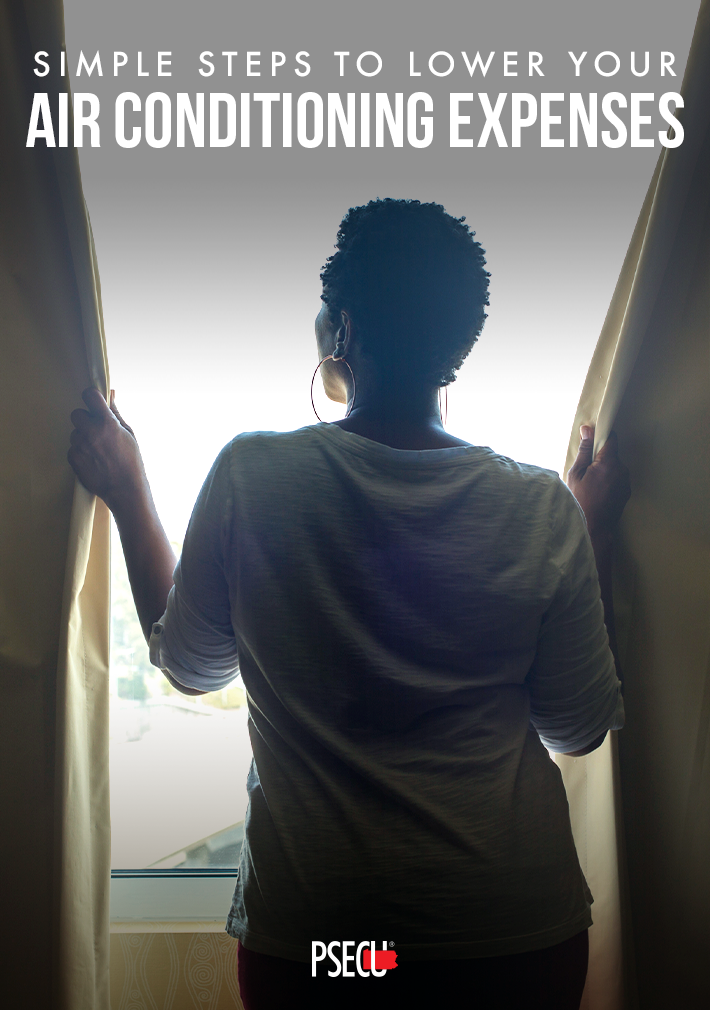Keeping the temperature of your house or apartment comfortable during the summer can get expensive. But just because temperatures may seem to rise exponentially doesn’t mean your electric bill has to. We’ve outlined some simple swaps and cost-free steps to keep your home cool and your bills low.

Simple Swaps
Use a Programmable Thermostat
Did you know that using a programmable thermostat can save you up to 10% on heating and cooling costs a year? In case you’re not familiar, these allow you to choose the temperature you want your house to be at during specific times of day. In the summertime, for example, you may choose to raise the temperature of your house while you’re at work and have it cooled off before you get home. Just be careful you’re not setting the temperatures so far apart that the unit works extra hard to cool the house, which could end up costing just as much.
Upgrade Your Air Conditioner
If you’ve been using the same window units for several years, it may be time for an upgrade. Look for new units that are ENERGY STAR® qualified. These are more efficient and cheaper to operate. As an added bonus, it’s not uncommon for electric companies to help customers with the proper recycling of old units and provide rebates to help offset the cost of new ones. Be sure to check what rebates may be available before you buy so you choose one that qualifies.
Replace Your Air Filter
Taking care of your unit can help it live longer and cost you less in both the short and long term. By some estimates, something as simple as swapping an old filter for a clean one can lower your unit’s energy usage by up to 15%.
Cost-Free Steps
Raise Your Thermostat a Few Degrees
This tip may be the most obvious, and it’s also likely to yield the most savings. It’s generally recommended that you set your thermostat to at least 78 degrees in the summer while you’re home. This may be a few degrees warmer than you’d like, but you’ll pay for each degree you lower the temperature.
Close Your Curtains
If you get a lot of natural light, consider closing the curtains during peak daylight hours. This will help keep heat out and keep the temperature down. If you rely on natural light and covering the window causes you to turn more lights on, consider a change to your lighting, which usually costs less than air conditioning.
Give Your Oven a Break
Using your oven raises the temperature of your kitchen, causing your air conditioning to kick on. Take advantage of nice summer weather by making use of your outdoor grill if you have one. This keeps the heat outside and saves you money. Don’t have a grill? Or just don’t have time? Consider putting a meal in the crockpot before leaving your house in the morning. Dinner can be ready by the time you get home without raising the temperature of your home.
Turn on Your Fans
In many instances, fans provide as much relief from the heat as air conditioners and use less electricity to operate. In fact, you can raise your thermostat up to 4 degrees without feeling a difference in comfort level when using a ceiling fan.
Only Cool the Rooms You Use
Only turn window units on when you’re in the room. Close doors or hang up heavy sheets to block doorways so cool air isn’t drifting into larger open spaces. Have central air? Close vents in rooms you don’t use so the unit’s not working to cool these spaces. Just make sure these rooms don’t have thermostats that will cause the unit to kick on indefinitely if the room stays warm.
Make a Commitment
Lowering your air conditioning costs is just one step toward reducing your electricity bill.
For more money-saving tips, visit our WalletWorks page.
The content provided in this publication is for informational purposes only. Nothing stated is to be construed as financial or legal advice. Some products not offered by PSECU. PSECU does not endorse any third parties, including, but not limited to, referenced individuals, companies, organizations, products, blogs, or websites. PSECU does not warrant any advice provided by third parties. PSECU does not guarantee the accuracy or completeness of the information provided by third parties. PSECU recommends that you seek the advice of a qualified financial, tax, legal, or other professional if you have questions.
